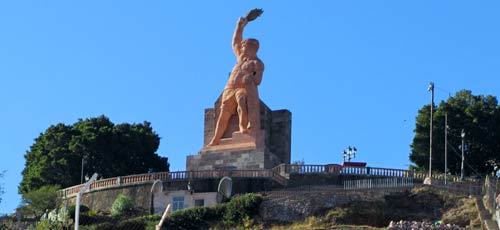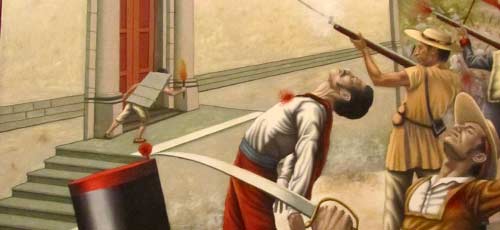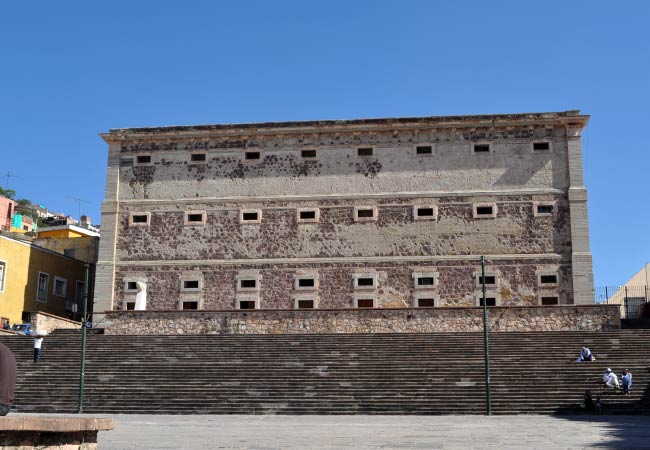GuanajuatoMexicoCity.com
The best independent guide to Guanajuato
GuanajuatoMexicoCity.com
The best independent guide to Guanajuato
El Pipila Story and History
The El Pipila monument in Guanajuato celebrates the unlikely hero of the first victory during the Mexican independence struggle. For a guide to his monument please click here.
El Pipila's heroic actions have become legend in Mexico and this guide will provide a brief description of the man and events that transformed him into a national hero.

The statue of El Pipila high above Guanajuato
The History of El Pipila
El Pipila was born a cripple and due to his unusual manner of walking was given the derisory nickname of El Pipila (the turkey). From his humble beginnings El Pipila became the champion of Guanajuato and Mexico.
El Pipila is remembered so fondly by the city that, for so many years tormented the poor cripple. El Pipila was born in 1783 and his birth name was Juan Amaro.
During his birth there were severe complications, which lead him to develop learning and physical disabilities. Later, while working in the silver mines he was given the El Pipila nickname due to his strange walking motion, which resembled a turkey.
Sometimes in history the most insignificant people have the moments to become heroes and legends as El Pipila did.
What did El Pipila do?
El Pipila's moment came during the early stages of the independence movement. The Spaniards feared the tensions in the Guanajuato region and barricaded themselves in the most fortified building of the city, the “Alhondiga de Granaditas”.
The “Alhondiga de Granaditas” was built as the city’s grain storage facility, but the solid stonewalls and suitable vantage points for archers to repel attackers made it a sensible defensive position.

A painting of El Pipila brave actions.
The Spaniard’s plan was to maintain their position until reinforcements could arrive to quell the rioters. This course of action appeared feasible until the brave actions of El Pipila.
El Pipila, not fearing for his safety strapped a large stone on his back, picked up a bucket of tar and grabbed a flaming torch and ran at the only weak point of the structure, the wooden door.
On his dash to the door, the stone on his back protected him from the arrows of the Spanish defenders. Once at the door he coated it in tar and set the tar alight by his torch.
The fire weakened the solid wood door and the smoke limited the sight of the archers allowing others to rush the door. The rioters forced open the door and flooded into the “Alhondiga de Granaditas”.

The Alhondiga Ganaditas in Guanajuato
The rioters killed the entire Spanish garrison of troops along with the refugees and plundered the treasures that had been hoarded by the Spanish.
This first victory inspired the masses and significantly enhanced the Mexican independence movement. El Pipila tale spread like wildfire and encourage peasants to revolt. If a lowly crippled miner could rise up so could the entire nation. Years later the Spanish were driven out of Mexico, but this allowed even harsher Silver Barons to fill the void.
The Statue dedicated to El Pipila stands high above Guanajuato holding his torch high. At the base of the large statue is the inscription “there are still other “alhondigas” to burn”.
The area surrounding the statue is popular for young Mexican couples to come and act as young lovers, as the area is far from the preying and gossiping eyes of neighbours and extended families.
Guanajuato Mexico Tourist Guide Navigation
|
| ||||||
|
| ||||||
|
| ||||||
|
| ||||||
|
|
|
| ||||||
|
| ||||||
|
| ||||||
|
| ||||||
|
|















